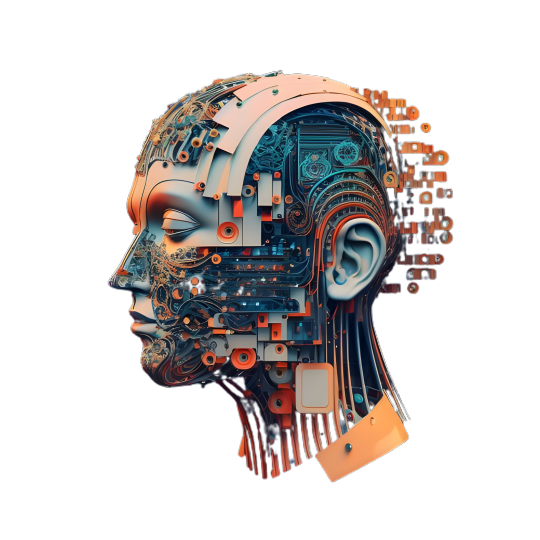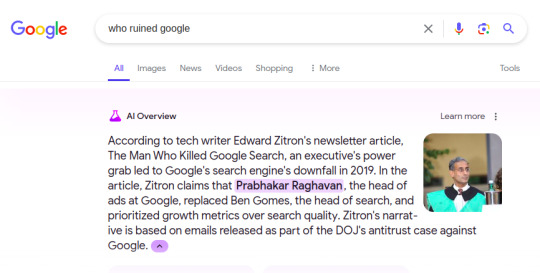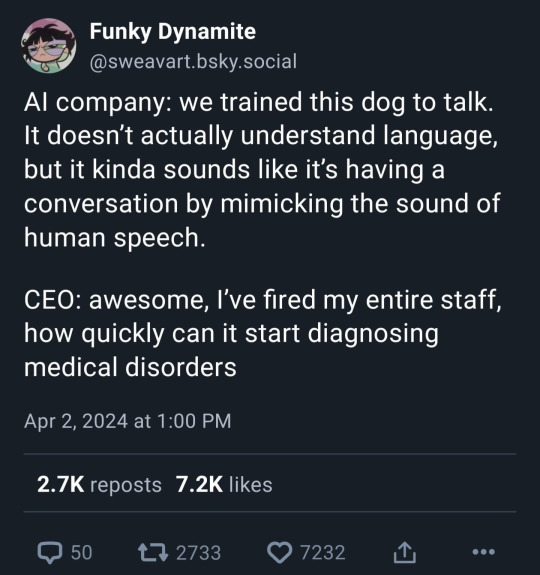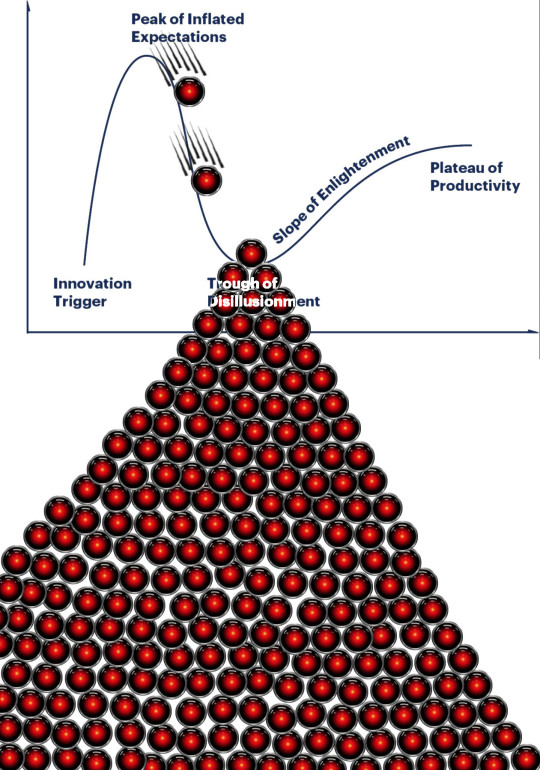#AI & ML
Explore tagged Tumblr posts
Text
𝗥𝗲𝘃𝗼𝗹𝘂𝘁𝗶𝗼𝗻𝗶𝘇𝗲 𝗬𝗼𝘂𝗿 𝗠𝗮𝗻𝘂𝗳𝗮𝗰𝘁𝘂𝗿𝗶𝗻𝗴 𝘄𝗶𝘁𝗵 𝗔𝗜-𝗱𝗿𝗶𝘃𝗲𝗻 𝗘𝗥𝗣 𝗦𝗼𝗹𝘂𝘁𝗶𝗼𝗻𝘀!
Discover how integrating Artificial Intelligence with Enterprise Resource Planning can transform your manufacturing operations. Check out our latest blog post to explore the future of smart manufacturing:
Read more about the next wave of intelligent ERP systems and stay ahead in the digital transformation race!
https://www.codetrade.io/blog/ai-driven-erp-solutions-for-the-manufacturing-industry/
#artificial intelligence#machine learning#erp solution#manufacturing industry#ERP in AI#enterprise resource planning#intelligent ERP system#AI ML#AI-driven ERP solutions
2 notes
·
View notes
Text
AI in Space Exploration: How Machine Learning is Driving NASA’s Missions
Artificial Intelligence (AI) and Machine Learning (ML) have significantly transformed space exploration, enabling agencies like NASA to push the boundaries of what is possible. From analyzing vast datasets to optimizing spacecraft navigation, AI is revolutionizing space technology. In this blog, we will explore how AI and ML are shaping space exploration and how businesses can leverage AI ML development services for cutting-edge solutions.
The Role of AI and ML in Space Exploration
1. Autonomous Spacecraft Navigation
AI and ML play a crucial role in improving spacecraft autonomy. With vast distances between Earth and distant planets, real-time human control is not feasible. NASA employs AI-powered autonomous navigation systems that help spacecraft make real-time decisions without waiting for instructions from mission control. This ensures efficient and safe space travel.
2. Predictive Maintenance and Spacecraft Health Monitoring
Machine learning algorithms analyze telemetry data from spacecraft to predict potential failures before they occur. By detecting anomalies, AI helps prevent critical malfunctions and extends the lifespan of space equipment. This predictive maintenance approach reduces costs and enhances mission reliability.
3. Rover Navigation and Exploration
AI-driven systems empower robotic rovers, such as NASA’s Perseverance, to explore planetary surfaces autonomously. These systems process images, detect obstacles, and determine optimal paths, enabling rovers to navigate harsh terrains without direct human intervention. AI also aids in selecting high-priority areas for scientific exploration.
4. Satellite Image Processing and Earth Observation
AI-powered image recognition models process massive amounts of satellite data, helping scientists monitor climate changes, detect natural disasters, and track environmental patterns. Machine learning enhances the accuracy of image classification, allowing researchers to make data-driven decisions with improved precision.
5. Deep Space Communication and AI-Enhanced Signal Processing
Machine learning optimizes deep space communication by filtering noise and improving signal clarity. AI models enhance data transmission efficiency, ensuring better connectivity between Earth and space missions. This advancement is crucial for long-term space exploration and interstellar travel.
6. Astronomical Data Analysis and Exoplanet Discovery
AI algorithms analyze vast datasets from telescopes like Kepler and James Webb to identify exoplanets and celestial objects. By detecting subtle patterns in light fluctuations, AI accelerates the discovery of potentially habitable planets beyond our solar system.
How Businesses Can Benefit from AI and ML Innovations
The advancements in AI-driven space exploration have direct applications across industries, from aerospace to healthcare, finance, and more. Partnering with an AI ML Development Company can help businesses integrate machine learning solutions for enhanced automation, predictive analytics, and data-driven decision-making.
Why Choose AI ML Development Services?
AI ML development services offer cutting-edge solutions for businesses looking to optimize operations, improve efficiency, and gain a competitive edge. Whether it’s predictive analytics, computer vision, or natural language processing, AI ML solutions can drive innovation across multiple domains.
Final Thoughts
AI and machine learning are playing a pivotal role in space exploration, helping NASA and other space agencies push the limits of scientific discovery. As AI technology continues to evolve, its applications will extend beyond space into various industries. If you're looking to leverage AI ML solutions for your business, partnering with an AI ML Development Company can help you unlock the full potential of artificial intelligence.
Are you ready to integrate AI into your business strategy? Explore our AI ML Development Services today!
#ai ml development#ai ml development services#ai ml solution#ai ml#artificial intelligent#machine learning#ai technology#artificial intelligence
0 notes
Text
Best Website Development, Mobile app Development, Digital Marketing, AI/ML Services.
Digital Hub Solution offers a wide range of services, including web and mobile app development, AI/ML solutions, digital marketing, UI/UX designing, virtual assistant services, and website designing. These services aim to enhance business growth, streamline processes, and improve user experience through innovative and tailored digital solutions.
0 notes
Text
AI-Driven Recruitment: How Automation is Redefining Talent Acquisition

The evolution of artificial intelligence (AI) is transforming numerous industries, with recruitment being one of the most impacted. Traditional recruitment methods, often characterized by manual processes and human bias, are giving way to AI-driven recruitment strategies that streamline and enhance talent acquisition. By leveraging AI, companies can automate many facets of recruitment, from sourcing candidates to onboarding, ultimately redefining how talent is acquired. This article explores how automation is reshaping recruitment and the benefits it offers to businesses striving to build competitive workforces.
The Rise of AI-Driven Recruitment
AI-driven recruitment involves using artificial intelligence and machine learning (ML) algorithms to automate and optimize various stages of the hiring process. The adoption of AI in recruitment is not merely a trend but a necessity as companies seek to manage large volumes of applications, reduce time-to-hire, and improve the overall candidate experience.
Focus Keyword: AI-Driven Recruitment
At its core, AI-driven recruitment addresses the inefficiencies of traditional hiring methods. Manual screening, which can be time-consuming and prone to errors, is being replaced by AI algorithms that can quickly and accurately assess large volumes of resumes. These algorithms use natural language processing (NLP) and machine learning models to identify key qualifications, skills, and experiences that match job requirements, allowing recruiters to focus on the most promising candidates.
Automation Across the Recruitment Funnel
Automation in recruitment spans multiple stages of the hiring funnel, from sourcing to onboarding. Below are some key areas where AI is making a significant impact:
Candidate Sourcing and Outreach: AI-powered tools can automatically source candidates from various platforms, including job boards, social media, and professional networks like LinkedIn. These tools analyze data to identify potential candidates who match the desired profile. Automation also extends to outreach, where AI-driven chatbots engage with candidates to schedule interviews or provide additional information about the job. By leveraging AI/ML development services, companies can ensure that their sourcing strategies are efficient and data-driven.
Resume ScreeningOne of the most time-consuming aspects of recruitment is resume screening. Traditionally, recruiters manually sift through resumes to identify suitable candidates, which can lead to missed opportunities or biased decisions. AI-driven recruitment tools, powered by machine learning services, can automatically screen resumes, rank candidates based on their qualifications, and even identify patterns that may indicate future performance. This reduces human bias and ensures that the most qualified candidates are not overlooked.
Interview Scheduling and Assessment: Coordinating interviews is another area where AI-driven recruitment shines. AI tools can automate the scheduling process by finding mutually convenient times for both candidates and interviewers. Furthermore, AI-driven assessment tools can analyze interview responses, evaluating them against pre-defined criteria. These assessments can include video interviews where facial expressions, tone of voice, and word choice are analyzed to provide insights into a candidate’s fit for the role.
Onboarding and Employee Experience: The automation of recruitment does not end with hiring. AI-driven onboarding systems can personalize the onboarding experience for new hires, guiding them through training modules, providing relevant resources, and connecting them with mentors. By utilizing Generative AI Services, companies can create tailored onboarding experiences that cater to the individual needs of each new employee, fostering engagement and improving retention rates.
The Benefits of AI-Driven Recruitment
AI-driven recruitment offers several benefits that make it an attractive option for businesses aiming to enhance their talent acquisition strategies. These benefits include:
Improved Efficiency and Speed: By automating repetitive tasks such as resume screening and interview scheduling, AI-driven recruitment drastically reduces the time-to-hire. This allows companies to fill critical roles faster, which is particularly beneficial in competitive job markets where top talent is quickly snapped up.
Enhanced Candidate Experience: Automation ensures that candidates receive timely communication and feedback throughout the hiring process. AI-driven chatbots can answer candidate queries 24/7, providing a seamless experience. Additionally, personalized interactions, made possible by AI/ML development services, make candidates feel valued and respected, improving the overall candidate experience.
Data-Driven Decision Making: AI-driven recruitment provides valuable insights into the hiring process. Data analytics can identify trends, such as the most effective sourcing channels or the characteristics of successful hires. This data-driven approach enables companies to continuously refine their recruitment strategies, ensuring they remain aligned with business goals.
Reduction of Bias: Human bias, whether conscious or unconscious, can negatively impact recruitment decisions. AI-driven recruitment helps mitigate bias by relying on objective data and predefined criteria. Machine learning services can be used to train algorithms to ignore irrelevant factors, such as gender, age, or ethnicity, focusing solely on qualifications and experience.
Challenges and Considerations
While AI-driven recruitment offers numerous advantages, it is not without challenges. One significant concern is the potential for algorithmic bias, where AI models may inadvertently learn and perpetuate biases present in historical data. To mitigate this risk, it is essential for companies to work with experienced AI/ML development services that prioritize fairness and transparency in their models.
Another consideration is the need for human oversight. While AI can automate many tasks, human judgment remains crucial, especially in cultural fit and team dynamics. AI should be viewed as a tool that enhances human capabilities rather than replacing them entirely.
The Future of AI-Driven Recruitment
As AI technology continues to evolve, the role of AI in recruitment will expand. Advanced AI models, powered by Generative AI Services, could potentially simulate real-world job scenarios during the assessment process, providing a more accurate measure of a candidate's abilities. Furthermore, AI could play a role in predicting future talent needs, allowing companies to proactively build talent pipelines.
In conclusion, AI-driven recruitment is transforming talent acquisition by automating time-consuming tasks, improving decision-making, and enhancing the candidate experience. As businesses continue to adopt AI technologies, those that leverage Machine Learning Services will be better positioned to attract, assess, and retain top talent in an increasingly competitive landscape.
#ai development services#ai development#ai ml development#machine learning services#machine learning#intellonix#innvonix#ai ml
0 notes
Text
Discover how AI revolutionizes data collection, from chatbots enhancing customer interactions to predictive analytics streamlining operations. Learn the benefits: up to 90% efficiency boost, 99% data accuracy, and 80% cost reduction. Explore smart data transformation services to harness these advantages and propel your business forward.
0 notes
Text
https://www.zymr.com/blog/smart-loans-how-ai-ml-can-help-reimagine-fintech-lending-platforms
The disruption in recent times underscores the dynamic nature of the financial landscape, especially the lending domain. Changing consumer behavior, new emerging technologies like blockchain, and shift in trends in funding and investment have had a severe impact on how fintech lending solutions are accommodated in the mainstream market. Despite rapid growth for a good period, funding for digital lending faces a significant decline of 53%, with just $11.5 billion raised during the year 2022, as per reports. Therefore, there is a need for fintech software development companies to build lending platforms that can regain ground in this ever-changing environment.
A crucial help in this context comes in the form of Artificial Intelligence. The integration of AI/ML will offer the potential for data-driven decision-making and precise lending models. Therefore, in addition to enhanced efficiency and reduced risks AI/ML services will also reignite interest and investor confidence in the digitalized financial services for lending.
In this blog, we will explore, in detail, how AI machine learning can play a pivotal role in building fintech lending platforms to meet the evolving market demands. We'll examine how AI/ML can help bridge the gap between declining funding and a thriving fintech lending ecosystem while maintaining essential features like CRM, LOS, LMS, and more that borrowers and investors rely on.
1 note
·
View note
Text
Apisdor
At Apisdor, we are driven by a passion for innovation through cutting-edge technology, which is deeply rooted in our DNA.
1 note
·
View note
Text





adrien tell ur mom to leave me alone !
#rip emilie agreste u would’ve loved breaking dawn pt. 1#and family vlogger youtube channels#and AI#my art#emilie agreste#ml#she’s plaguing me. can you tell#miraculous#miraculous ladybug#gabriel agreste#nathalie sancoeur#i think it’s so swag that peacock holders don’t get masks#they just turn purple#the peacock miraculous made everyone slay#except for gabe. that man couldn’t slay if his life depended on it. he only knows how do get uglier.#anyway shout out to the emilie agreste who lives in my brain. that girl is crazy#thirteen#eye strain#tw eyestrain#eyestrain
5K notes
·
View notes
Text
I asked Google "who ruined Google" and they replied honestly using their AI, which is now forced on all of us. It's too funny not to share!

1K notes
·
View notes
Text



Doodles :)
I think the Graham de Vanilys should have some cats and ferrets, Félix seems like a ferret liker <3 The doodles on the last image are old ones i never got aroun to posting, mostly consisting of the aged up designs i have 4 feligami
#Miraculous is eating at my brain again who wouldve guessed (me)#its always eating at my brain tbh tho#Adrien Agreste#Felix Graham de Vanily#Nathalie Sancoeur#Amelie Graham de Vanily#amenath#Kagami Tsurugi#Feligami#the names for the cats r based off a Felix ai I had a couple chats with#Do i just like giving characters im attached to cats because I have cats? yeah. probably. it brings me joy <3#my art#miraculous tales of ladybug and chat noir#miraculous adventures of ladybug and chat noir#miraculous ladybug#ml representation spoilers#ml representation#I am an its Amelie not Emilie believer btw#ALSO Felix would love Shad ow the Hedg ehog
4K notes
·
View notes
Text
90% of documentation sucks. 99% of LLM documentation sucks. Why? Possibilities:
LLM devs lack the necessary skills to write docs because they're under the age of 25 and have been working on the same couple projects that whole time.
LLM devs don't understand why docs are important because they're under the age of 25 and have been working on the same couple projects that whole time.
LLM devs view their work in the way that mystery cults view their worship, and enter an ecstatic state not conducive to communication upon opening Jupyter Notebook/Google Colab/etc. (It's like when a snake-handling churchgoer picks up the snake.)
LLM devs choose not to write docs because they think that providing publicly-accessible information on how their code can be used makes their expertise less-valuable in the job market:
"If I'm the only one who understands the tools I made, people who want to use my work will have to pay me."
-- Final words of 10,000 naive LLM devs who have spent the last 2 years duplicating each other's work without realizing it, because they have never provided a coherent public explanation of what their work is intended to do, making it impossible either for them to find each other or for prospective users to find them. They died of dysentery.
If they had lived only a few months longer, they'd have gotten back in the computer chair and discovered, with mounting horror, that they no longer know how to use their own work, because they spent a few months doing something else (hospital, PT, etc) and the unwritten knowledge that they thought they had hoarded - in fact recalled only due to near-daily repetition - fell out of their heads, teaching them an important lesson about their own fallibility.
They didn't, though. They died of dysentery. Very sad.
165 notes
·
View notes
Text

Museru Kurai no Ai o Ageru
#Museru Kurai no Ai o Ageru#Museru Kurai no Ai wo Ageru#Choking on Love#Iwashita Keiko#shoujo#manga#shoujo manga#shoujo romance#romance manga#manga cap#shoujo cap#romance cap#university manga#shoujo caps#manga ml#shoujo ml
84 notes
·
View notes
Text
Felix: I don’t know what you all are talkin about, but it’s probably absolutely ridiculous.
Adrien and Nino:
Nino: AbsoLOOTeLAY

#cockney Felix would be SO CUTEEE#AMELIE ALSO HAVING A COCKNEY ACCENT TOO-#she would annoy Gabriel 10x more#mlb#mlb ai#chocoau#miraculous ladybug#ml#delete later
164 notes
·
View notes
Text
i think it would be funny if one of the ways that adrien responded to Everything was by becoming the most offline unreachable hermit of all time. no phone no computer nothing. don’t talk to him about ai or instagram brand deals or twitter drama he can’t even receive a text message. if you want to contact him he checks his email once a week at the local library. he also has a flip phone with customized ringtones and no internet connection, and a number he gives out to an extremely select list of people. don’t try to reference a pop culture phenomenon to him he won’t understand it. his flip phone can’t open tiktoks. he’s protecting his peace.
#something about being turned into an ai siri for millions of people at age 14 turned him off from technology#he does the wordle. maybe.#more likely he does the crossword#ml#anna rambles
656 notes
·
View notes
Text

401 notes
·
View notes
Text
The AI hype bubble is the new crypto hype bubble

Back in 2017 Long Island Ice Tea — known for its undistinguished, barely drinkable sugar-water — changed its name to “Long Blockchain Corp.” Its shares surged to a peak of 400% over their pre-announcement price. The company announced no specific integrations with any kind of blockchain, nor has it made any such integrations since.
If you’d like an essay-formatted version of this post to read or share, here’s a link to it on pluralistic.net, my surveillance-free, ad-free, tracker-free blog:
https://pluralistic.net/2023/03/09/autocomplete-worshippers/#the-real-ai-was-the-corporations-that-we-fought-along-the-way
LBCC was subsequently delisted from NASDAQ after settling with the SEC over fraudulent investor statements. Today, the company trades over the counter and its market cap is $36m, down from $138m.
https://cointelegraph.com/news/textbook-case-of-crypto-hype-how-iced-tea-company-went-blockchain-and-failed-despite-a-289-percent-stock-rise
The most remarkable thing about this incredibly stupid story is that LBCC wasn’t the peak of the blockchain bubble — rather, it was the start of blockchain’s final pump-and-dump. By the standards of 2022’s blockchain grifters, LBCC was small potatoes, a mere $138m sugar-water grift.
They didn’t have any NFTs, no wash trades, no ICO. They didn’t have a Superbowl ad. They didn’t steal billions from mom-and-pop investors while proclaiming themselves to be “Effective Altruists.” They didn’t channel hundreds of millions to election campaigns through straw donations and other forms of campaing finance frauds. They didn’t even open a crypto-themed hamburger restaurant where you couldn’t buy hamburgers with crypto:
https://robbreport.com/food-drink/dining/bored-hungry-restaurant-no-cryptocurrency-1234694556/
They were amateurs. Their attempt to “make fetch happen” only succeeded for a brief instant. By contrast, the superpredators of the crypto bubble were able to make fetch happen over an improbably long timescale, deploying the most powerful reality distortion fields since Pets.com.
Anything that can’t go on forever will eventually stop. We’re told that trillions of dollars’ worth of crypto has been wiped out over the past year, but these losses are nowhere to be seen in the real economy — because the “wealth” that was wiped out by the crypto bubble’s bursting never existed in the first place.
Like any Ponzi scheme, crypto was a way to separate normies from their savings through the pretense that they were “investing” in a vast enterprise — but the only real money (“fiat” in cryptospeak) in the system was the hardscrabble retirement savings of working people, which the bubble’s energetic inflaters swapped for illiquid, worthless shitcoins.
We’ve stopped believing in the illusory billions. Sam Bankman-Fried is under house arrest. But the people who gave him money — and the nimbler Ponzi artists who evaded arrest — are looking for new scams to separate the marks from their money.
Take Morganstanley, who spent 2021 and 2022 hyping cryptocurrency as a massive growth opportunity:
https://cointelegraph.com/news/morgan-stanley-launches-cryptocurrency-research-team
Today, Morganstanley wants you to know that AI is a $6 trillion opportunity.
They’re not alone. The CEOs of Endeavor, Buzzfeed, Microsoft, Spotify, Youtube, Snap, Sports Illustrated, and CAA are all out there, pumping up the AI bubble with every hour that god sends, declaring that the future is AI.
https://www.hollywoodreporter.com/business/business-news/wall-street-ai-stock-price-1235343279/
Google and Bing are locked in an arms-race to see whose search engine can attain the speediest, most profound enshittification via chatbot, replacing links to web-pages with florid paragraphs composed by fully automated, supremely confident liars:
https://pluralistic.net/2023/02/16/tweedledumber/#easily-spooked
Blockchain was a solution in search of a problem. So is AI. Yes, Buzzfeed will be able to reduce its wage-bill by automating its personality quiz vertical, and Spotify’s “AI DJ” will produce slightly less terrible playlists (at least, to the extent that Spotify doesn’t put its thumb on the scales by inserting tracks into the playlists whose only fitness factor is that someone paid to boost them).
But even if you add all of this up, double it, square it, and add a billion dollar confidence interval, it still doesn’t add up to what Bank Of America analysts called “a defining moment — like the internet in the ’90s.” For one thing, the most exciting part of the “internet in the ‘90s” was that it had incredibly low barriers to entry and wasn’t dominated by large companies — indeed, it had them running scared.
The AI bubble, by contrast, is being inflated by massive incumbents, whose excitement boils down to “This will let the biggest companies get much, much bigger and the rest of you can go fuck yourselves.” Some revolution.
AI has all the hallmarks of a classic pump-and-dump, starting with terminology. AI isn’t “artificial” and it’s not “intelligent.” “Machine learning” doesn’t learn. On this week’s Trashfuture podcast, they made an excellent (and profane and hilarious) case that ChatGPT is best understood as a sophisticated form of autocomplete — not our new robot overlord.
https://open.spotify.com/episode/4NHKMZZNKi0w9mOhPYIL4T
We all know that autocomplete is a decidedly mixed blessing. Like all statistical inference tools, autocomplete is profoundly conservative — it wants you to do the same thing tomorrow as you did yesterday (that’s why “sophisticated” ad retargeting ads show you ads for shoes in response to your search for shoes). If the word you type after “hey” is usually “hon” then the next time you type “hey,” autocomplete will be ready to fill in your typical following word — even if this time you want to type “hey stop texting me you freak”:
https://blog.lareviewofbooks.org/provocations/neophobic-conservative-ai-overlords-want-everything-stay/
And when autocomplete encounters a new input — when you try to type something you’ve never typed before — it tries to get you to finish your sentence with the statistically median thing that everyone would type next, on average. Usually that produces something utterly bland, but sometimes the results can be hilarious. Back in 2018, I started to text our babysitter with “hey are you free to sit” only to have Android finish the sentence with “on my face” (not something I’d ever typed!):
https://mashable.com/article/android-predictive-text-sit-on-my-face
Modern autocomplete can produce long passages of text in response to prompts, but it is every bit as unreliable as 2018 Android SMS autocomplete, as Alexander Hanff discovered when ChatGPT informed him that he was dead, even generating a plausible URL for a link to a nonexistent obit in The Guardian:
https://www.theregister.com/2023/03/02/chatgpt_considered_harmful/
Of course, the carnival barkers of the AI pump-and-dump insist that this is all a feature, not a bug. If autocomplete says stupid, wrong things with total confidence, that’s because “AI” is becoming more human, because humans also say stupid, wrong things with total confidence.
Exhibit A is the billionaire AI grifter Sam Altman, CEO if OpenAI — a company whose products are not open, nor are they artificial, nor are they intelligent. Altman celebrated the release of ChatGPT by tweeting “i am a stochastic parrot, and so r u.”
https://twitter.com/sama/status/1599471830255177728
This was a dig at the “stochastic parrots” paper, a comprehensive, measured roundup of criticisms of AI that led Google to fire Timnit Gebru, a respected AI researcher, for having the audacity to point out the Emperor’s New Clothes:
https://www.technologyreview.com/2020/12/04/1013294/google-ai-ethics-research-paper-forced-out-timnit-gebru/
Gebru’s co-author on the Parrots paper was Emily M Bender, a computational linguistics specialist at UW, who is one of the best-informed and most damning critics of AI hype. You can get a good sense of her position from Elizabeth Weil’s New York Magazine profile:
https://nymag.com/intelligencer/article/ai-artificial-intelligence-chatbots-emily-m-bender.html
Bender has made many important scholarly contributions to her field, but she is also famous for her rules of thumb, which caution her fellow scientists not to get high on their own supply:
Please do not conflate word form and meaning
Mind your own credulity
As Bender says, we’ve made “machines that can mindlessly generate text, but we haven’t learned how to stop imagining the mind behind it.” One potential tonic against this fallacy is to follow an Italian MP’s suggestion and replace “AI” with “SALAMI” (“Systematic Approaches to Learning Algorithms and Machine Inferences”). It’s a lot easier to keep a clear head when someone asks you, “Is this SALAMI intelligent? Can this SALAMI write a novel? Does this SALAMI deserve human rights?”
Bender’s most famous contribution is the “stochastic parrot,” a construct that “just probabilistically spits out words.” AI bros like Altman love the stochastic parrot, and are hellbent on reducing human beings to stochastic parrots, which will allow them to declare that their chatbots have feature-parity with human beings.
At the same time, Altman and Co are strangely afraid of their creations. It’s possible that this is just a shuck: “I have made something so powerful that it could destroy humanity! Luckily, I am a wise steward of this thing, so it’s fine. But boy, it sure is powerful!”
They’ve been playing this game for a long time. People like Elon Musk (an investor in OpenAI, who is hoping to convince the EU Commission and FTC that he can fire all of Twitter’s human moderators and replace them with chatbots without violating EU law or the FTC’s consent decree) keep warning us that AI will destroy us unless we tame it.
There’s a lot of credulous repetition of these claims, and not just by AI’s boosters. AI critics are also prone to engaging in what Lee Vinsel calls criti-hype: criticizing something by repeating its boosters’ claims without interrogating them to see if they’re true:
https://sts-news.medium.com/youre-doing-it-wrong-notes-on-criticism-and-technology-hype-18b08b4307e5
There are better ways to respond to Elon Musk warning us that AIs will emulsify the planet and use human beings for food than to shout, “Look at how irresponsible this wizard is being! He made a Frankenstein’s Monster that will kill us all!” Like, we could point out that of all the things Elon Musk is profoundly wrong about, he is most wrong about the philosophical meaning of Wachowksi movies:
https://www.theguardian.com/film/2020/may/18/lilly-wachowski-ivana-trump-elon-musk-twitter-red-pill-the-matrix-tweets
But even if we take the bros at their word when they proclaim themselves to be terrified of “existential risk” from AI, we can find better explanations by seeking out other phenomena that might be triggering their dread. As Charlie Stross points out, corporations are Slow AIs, autonomous artificial lifeforms that consistently do the wrong thing even when the people who nominally run them try to steer them in better directions:
https://media.ccc.de/v/34c3-9270-dude_you_broke_the_future
Imagine the existential horror of a ultra-rich manbaby who nominally leads a company, but can’t get it to follow: “everyone thinks I’m in charge, but I’m actually being driven by the Slow AI, serving as its sock puppet on some days, its golem on others.”
Ted Chiang nailed this back in 2017 (the same year of the Long Island Blockchain Company):
There’s a saying, popularized by Fredric Jameson, that it’s easier to imagine the end of the world than to imagine the end of capitalism. It’s no surprise that Silicon Valley capitalists don’t want to think about capitalism ending. What’s unexpected is that the way they envision the world ending is through a form of unchecked capitalism, disguised as a superintelligent AI. They have unconsciously created a devil in their own image, a boogeyman whose excesses are precisely their own.
https://www.buzzfeednews.com/article/tedchiang/the-real-danger-to-civilization-isnt-ai-its-runaway
Chiang is still writing some of the best critical work on “AI.” His February article in the New Yorker, “ChatGPT Is a Blurry JPEG of the Web,” was an instant classic:
[AI] hallucinations are compression artifacts, but — like the incorrect labels generated by the Xerox photocopier — they are plausible enough that identifying them requires comparing them against the originals, which in this case means either the Web or our own knowledge of the world.
https://www.newyorker.com/tech/annals-of-technology/chatgpt-is-a-blurry-jpeg-of-the-web
“AI” is practically purpose-built for inflating another hype-bubble, excelling as it does at producing party-tricks — plausible essays, weird images, voice impersonations. But as Princeton’s Matthew Salganik writes, there’s a world of difference between “cool” and “tool”:
https://freedom-to-tinker.com/2023/03/08/can-chatgpt-and-its-successors-go-from-cool-to-tool/
Nature can claim “conversational AI is a game-changer for science” but “there is a huge gap between writing funny instructions for removing food from home electronics and doing scientific research.” Salganik tried to get ChatGPT to help him with the most banal of scholarly tasks — aiding him in peer reviewing a colleague’s paper. The result? “ChatGPT didn’t help me do peer review at all; not one little bit.”
The criti-hype isn’t limited to ChatGPT, of course — there’s plenty of (justifiable) concern about image and voice generators and their impact on creative labor markets, but that concern is often expressed in ways that amplify the self-serving claims of the companies hoping to inflate the hype machine.
One of the best critical responses to the question of image- and voice-generators comes from Kirby Ferguson, whose final Everything Is a Remix video is a superb, visually stunning, brilliantly argued critique of these systems:
https://www.youtube.com/watch?v=rswxcDyotXA
One area where Ferguson shines is in thinking through the copyright question — is there any right to decide who can study the art you make? Except in some edge cases, these systems don’t store copies of the images they analyze, nor do they reproduce them:
https://pluralistic.net/2023/02/09/ai-monkeys-paw/#bullied-schoolkids
For creators, the important material question raised by these systems is economic, not creative: will our bosses use them to erode our wages? That is a very important question, and as far as our bosses are concerned, the answer is a resounding yes.
Markets value automation primarily because automation allows capitalists to pay workers less. The textile factory owners who purchased automatic looms weren’t interested in giving their workers raises and shorting working days. ‘ They wanted to fire their skilled workers and replace them with small children kidnapped out of orphanages and indentured for a decade, starved and beaten and forced to work, even after they were mangled by the machines. Fun fact: Oliver Twist was based on the bestselling memoir of Robert Blincoe, a child who survived his decade of forced labor:
https://www.gutenberg.org/files/59127/59127-h/59127-h.htm
Today, voice actors sitting down to record for games companies are forced to begin each session with “My name is ______ and I hereby grant irrevocable permission to train an AI with my voice and use it any way you see fit.”
https://www.vice.com/en/article/5d37za/voice-actors-sign-away-rights-to-artificial-intelligence
Let’s be clear here: there is — at present — no firmly established copyright over voiceprints. The “right” that voice actors are signing away as a non-negotiable condition of doing their jobs for giant, powerful monopolists doesn’t even exist. When a corporation makes a worker surrender this right, they are betting that this right will be created later in the name of “artists’ rights” — and that they will then be able to harvest this right and use it to fire the artists who fought so hard for it.
There are other approaches to this. We could support the US Copyright Office’s position that machine-generated works are not works of human creative authorship and are thus not eligible for copyright — so if corporations wanted to control their products, they’d have to hire humans to make them:
https://www.theverge.com/2022/2/21/22944335/us-copyright-office-reject-ai-generated-art-recent-entrance-to-paradise
Or we could create collective rights that belong to all artists and can’t be signed away to a corporation. That’s how the right to record other musicians’ songs work — and it’s why Taylor Swift was able to re-record the masters that were sold out from under her by evil private-equity bros::
https://doctorow.medium.com/united-we-stand-61e16ec707e2
Whatever we do as creative workers and as humans entitled to a decent life, we can’t afford drink the Blockchain Iced Tea. That means that we have to be technically competent, to understand how the stochastic parrot works, and to make sure our criticism doesn’t just repeat the marketing copy of the latest pump-and-dump.
Today (Mar 9), you can catch me in person in Austin at the UT School of Design and Creative Technologies, and remotely at U Manitoba’s Ethics of Emerging Tech Lecture.
Tomorrow (Mar 10), Rebecca Giblin and I kick off the SXSW reading series.
Image: Cryteria (modified) https://commons.wikimedia.org/wiki/File:HAL9000.svg
CC BY 3.0 https://creativecommons.org/licenses/by/3.0/deed.en
[Image ID: A graph depicting the Gartner hype cycle. A pair of HAL 9000's glowing red eyes are chasing each other down the slope from the Peak of Inflated Expectations to join another one that is at rest in the Trough of Disillusionment. It, in turn, sits atop a vast cairn of HAL 9000 eyes that are piled in a rough pyramid that extends below the graph to a distance of several times its height.]
#pluralistic#ai#ml#machine learning#artificial intelligence#chatbot#chatgpt#cryptocurrency#gartner hype cycle#hype cycle#trough of disillusionment#crypto#bubbles#bubblenomics#criti-hype#lee vinsel#slow ai#timnit gebru#emily bender#paperclip maximizers#enshittification#immortal colony organisms#blurry jpegs#charlie stross#ted chiang
2K notes
·
View notes